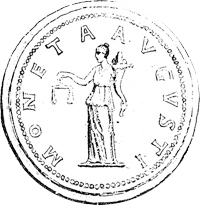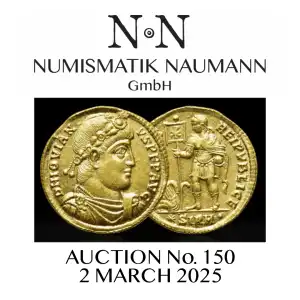

THEODOSIUS I (379-395). GOLD Solidus. Constantinople.
Obv: D N THEODOSIVS P F AVG.
Rosette-diademed, draped and cuirassed bust right.
Rev: CONCORDIA AVGGG Z / CONOB.
Concordia, with foot set upon eagle-headed prow, seated facing on throne, head right, holding sceptre and globus.
RIC 45d.6; Depeyrot 33/3.
Theodosius I, called "the Great" by Christian writers, was of Spanish origin. His father was a magister equitum who fell into disgrace under Valentinian I and was later executed by Gratian. However, Theodosius' military exploits in Britain against the Alamanni and Sarmati, and in Africa against the usurper Firmus, induced Gratian to elevate him to the rank of Augustus of the East in 379, to give him control of Thrace, Dacia and Macedonia. Theodosius managed to prevent another war against the Huns and Visigoths by signing an agreement in 382, allowing them to settle in Thrace on condition that they fight for him. The need to pay these mercenaries caused a considerable tax increase for the Romans, but it proved to be a successful move. Upon Gratian's death, the usurper of Britain, Magnus Maximus, marched into Italy and threatened the throne of Valentinian II. Theodosius married Valentinian II's sister, Galla, and succeeded in defeating Magnus Maximus in 388 with troops from the Visigoths and Huns. Another threat, however, was posed by Arbogaste, a Frankish general, who was able to put Eugenius on the Western throne instead of Valentinian II. Theodosius refused to recognize his position and appointed his son, Honorius, as Augustus of the West, inducing Eugenius to invade Italy and start a war. Eugenius and Arbogaste were defeated at the Frigidus River in 394, and Theodosius became sole Augustus of the entire empire, but he died shortly thereafter in Mediolanum. His funeral was celebrated by Bishop Ambrose, and the body was transported to Constantinople, where the consecratio took place. Theodosius is remembered as a fervent believer in the Nicene faith and for issuing the Edict of Thessalonica, by which he attempted to end theological disputes. He also made Christianity the sole state religion in 380, declaring Arians and devotees of other movements heretics. In 392 he banned the pagan religion.
Condition: Extremely fine.
Weight: 4.43 g.
Diameter: 20 mm.
Obv: D N THEODOSIVS P F AVG.
Rosette-diademed, draped and cuirassed bust right.
Rev: CONCORDIA AVGGG Z / CONOB.
Concordia, with foot set upon eagle-headed prow, seated facing on throne, head right, holding sceptre and globus.
RIC 45d.6; Depeyrot 33/3.
Theodosius I, called "the Great" by Christian writers, was of Spanish origin. His father was a magister equitum who fell into disgrace under Valentinian I and was later executed by Gratian. However, Theodosius' military exploits in Britain against the Alamanni and Sarmati, and in Africa against the usurper Firmus, induced Gratian to elevate him to the rank of Augustus of the East in 379, to give him control of Thrace, Dacia and Macedonia. Theodosius managed to prevent another war against the Huns and Visigoths by signing an agreement in 382, allowing them to settle in Thrace on condition that they fight for him. The need to pay these mercenaries caused a considerable tax increase for the Romans, but it proved to be a successful move. Upon Gratian's death, the usurper of Britain, Magnus Maximus, marched into Italy and threatened the throne of Valentinian II. Theodosius married Valentinian II's sister, Galla, and succeeded in defeating Magnus Maximus in 388 with troops from the Visigoths and Huns. Another threat, however, was posed by Arbogaste, a Frankish general, who was able to put Eugenius on the Western throne instead of Valentinian II. Theodosius refused to recognize his position and appointed his son, Honorius, as Augustus of the West, inducing Eugenius to invade Italy and start a war. Eugenius and Arbogaste were defeated at the Frigidus River in 394, and Theodosius became sole Augustus of the entire empire, but he died shortly thereafter in Mediolanum. His funeral was celebrated by Bishop Ambrose, and the body was transported to Constantinople, where the consecratio took place. Theodosius is remembered as a fervent believer in the Nicene faith and for issuing the Edict of Thessalonica, by which he attempted to end theological disputes. He also made Christianity the sole state religion in 380, declaring Arians and devotees of other movements heretics. In 392 he banned the pagan religion.
Condition: Extremely fine.
Weight: 4.43 g.
Diameter: 20 mm.
Watch:
Starting price:
€ 400
Current bid:
€ 1'300
€
B.P.: 18.90%
Closing on: 2025-03-02 15:00:00 Roma time


